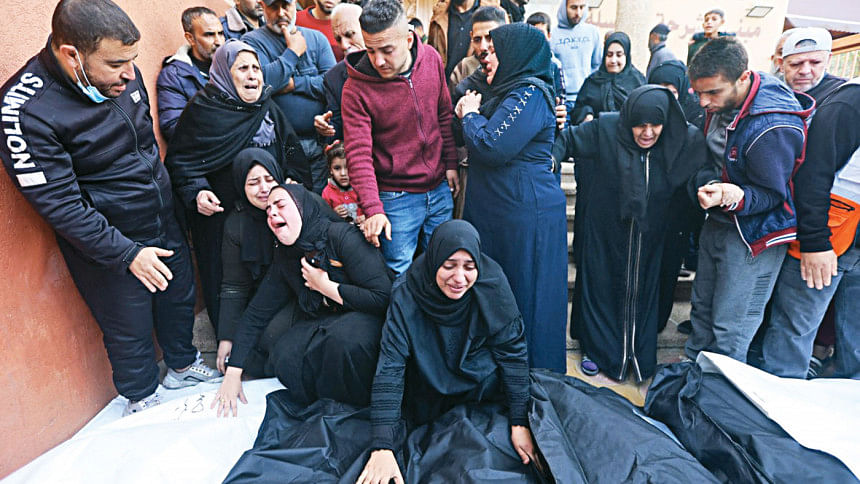20,000 killed so far in Gaza

Hopes rose of a ceasefire in Gaza diplomacy gathered pace ahead of a UN Security Council vote as death toll in the Palestinian enclave from the Israeli bombardment crossed 20,000.
While some talked of a truce, relentless Israeli strikes killed dozens more in the besieged territory.
However, right-wing Israeli Prime Minister Benjamin Netanyahu said there can be no Gaza ceasefire until Hamas group is destroyed, but the White House expressed hope that the truce talks can bring results.
"These are very serious discussions and negotiations and we hope that they lead somewhere," National Security Council spokesman John Kirby told reporters.
His comments came shortly after Netanyahu, under pressure from Washington and other allies over civilian casualties, reiterated his goal of destroying Hamas, the ruler of Palestinian enclave Gaza, and said there will be no ceasefire until that is accomplished.
The bloodiest-ever Gaza conflict, which began on October 7, has destroyed or damaged more than 60 percent of Gaza's infrastructure and displaced more than 90 percent of the 2.3 million population.
The Gaza Government Media Office yesterday said the death toll in the territory crosses 20,000, including more than 8,000 children and 6,200 women. However, it didn't give any breakdown of the casualties.
Meanwhile, Mossad director David Barnea held a "positive meeting" in Warsaw this week with CIA chief Bill Burns and Qatari Prime Minister Sheikh Mohammed bin Abdulrahman Al Thani, a source familiar with the talks told AFP, asking not to be named.
Talks were ongoing "with the aim of reaching an agreement around the release of the remaining hostages in Gaza in exchange for a truce and the potential release of Palestinians held in Israeli prisons," said the source.
Qatar, backed by Egypt and the United States, last month helped broker a first week-long truce in which 80 Israeli hostages were freed in exchange for 240 Palestinian prisoners.
The Qatar-based chief of Hamas, Ismail Haniyeh, yesterday arrived in Egypt for talks with intelligence chief Abbas Kamel.
A Hamas official, speaking on condition of anonymity, told AFP in Gaza that "a total ceasefire and a retreat of the Israeli occupation army from the Gaza Strip are a precondition for any serious negotiation" on a hostage-prisoner swap.
A source close to Hamas earlier said the Egypt talks would focus on proposals including a week-long truce that would see the release of 40 Israeli hostages.
Before leaving Qatar, Haniyeh met Iranian Foreign Minister Hossein Amir-Abdollahian but no details were released.
In Rafah, where fireballs and black smoke rose after explosions, residents expressed hope that talks would succeed.
"I wish for a complete ceasefire, and to put an end to the series of death and suffering. It's been more than 75 days," said Kassem Shurrab, 25.
Bassil Khoder, 63, said a ceasefire would allow displaced Palestinians like him to return home but it would also be good for Israelis. "The Jews are also our neighbours," he said. "We won't give up on them."
An AFPTV live camera yesterday filmed two bombs hitting Rafah, in southern Gaza where many of the territory's estimated 1.9 million displaced have fled.
The Hamas health ministry said Israeli strikes killed at least 12 Palestinians when houses and a mosque in Rafah "were targeted".
Meanwhile, the United Nations Security Council delayed a vote on a much-delayed resolution calling for a pause to the war for another day. The vote is now expected to be held today (Thursday).
The latest version of the text seen by AFP calls for the "urgent suspension" of hostilities.
The United States vetoed a previous ceasefire resolution.
The more than two-month-old conflict has caused a humanitarian crisis in Gaza that aid agencies are calling a "moral failure" of the international community.

 For all latest news, follow The Daily Star's Google News channel.
For all latest news, follow The Daily Star's Google News channel. 



Comments